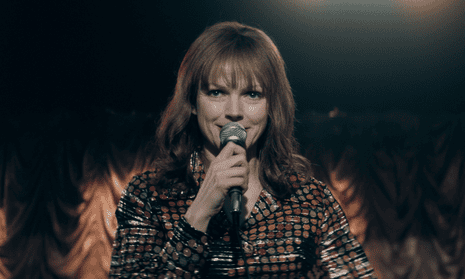There are several moments in this astringently uncomfortable tragicomedy – which boasts a blistering central performance by Maxine Peake – that will leave audiences squirming and divided. Funny Cow follows the changing fortunes of a standup comic finding her feet in the northern working men’s clubs of the 70s. It has been described by writer and co-star Tony Pitts as “an unblinking obituary” and “unsentimental commentary” on the culture in which he grew up. Some will be shocked by Peake’s “Funny Cow” (we know her only by her stage name), winning round hostile audiences with un-PC gags that were once the backbone of the British club circuit. Others will simply nod in resigned recognition at this hard-knocks world in which “it’s not about being funny, it’s about surviving”.
There are echoes of Mat Whitecross’s 2010 Ian Dury biopic Sex & Drugs & Rock & Roll in the slightly surreal framing sequences through which Peake’s antiheroine presents a cabaret-style collage of her life. Stepping into the backstreets of her past, the now successful adult, who combines the glamour of Marti Caine with the true grit of Cathy Come Home actress Carol White, meets her childhood self: a vibrant, crimson streak in a drab, grey world. Habitually dressed in red, this young firebrand carries a balloon and believes she can fly – an image that recurs throughout the film.
Fleeing the nest, she moves in with Bob (Pitts), whose violent rages she meets with a deadpan defiance learned at the wrong end of her father’s belt (“Are you angry? You seem angry”). Later she picks up with Paddy Considine’s parodically middle-class Angus, who takes her to see Albert Lamorisse’s Le Ballon Rouge, and causes her to exclaim, “I’m not Eliza fucking Doolittle!”
Having embraced her outsider status as a child, Peake’s misfit only feels at home on stage. “I can’t be a civilian,” she tells Alun Armstrong’s Lenny, the miserable “master of mirth” who assures her that “women aren’t funny”, and suggests she try singing or stripping instead. “I died years ago,” Lenny admits despondently. “I’m a comedic zombie.” As for Funny Cow, she has learned to “spit it out or swallow it up”; to accept that life can be “too much and not enough at the same time”.
From brutal domestic fireworks to shabby onstage entrances, cinematographer Tony Slater Ling’s focus rarely strays from Peake’s protagonist, with Steadicam operator Roger Tooley following her down streets and corridors, sticking close to her side. It’s an intimate portrait of an often abrasive character who wears her inability to love as a badge of honour. Peake rises magnificently to the challenges of the role, her face flickering between a practised smile and a silent scream, ripe with contradiction. A scene in which the camera holds her gaze as she freezes on stage is particularly unforgiving – a symphony of pain and panic, sadness and rage, all playing simultaneously across Peake’s mercurial face.
There are clear connections to Trevor Griffiths’s play Comedians, along with more unexpected echoes of David Seltzer’s often forgotten film Punchline. One critic famously charged the latter with committing the unforgivable sin of being “a movie about comedy that’s not funny” – something that could also be said of Funny Cow. But while the standup declares that it’s her job to “make ’em laugh”, Pitts and director Adrian Shergold, a TV veteran whose credits include the brilliant Pierrepoint, are aiming for something more complex – to make us care for Funny Cow without feeling sorry for her.
The supporting roles are solid, from Stephen Graham’s twin turn as brutal father and cowed brother, to Lindsey Coulson’s heartbreaking performance as an increasingly lonely mum, driven to drink by the sheer coldness of life. There are some eye-catching cameos, too, from comedians such as John Bishop and Jim Moir (AKA Vic Reeves) to Dexys frontman Kevin Rowland, in superbly morose form. Richard Hawley pops up as part of a nightclub duo with Corinne Bailey Rae, and also serves as the film’s composer, providing bittersweet counterpoint to the downbeat drama. As Kim Longinotto demonstrated in her wonderful documentary Love Is All (2014), there’s a uniquely cinematic quality to Hawley’s work, with its peerless evocation of social realism and romantic beauty intertwined. Funny Cow may prove as hard to embrace as its spiky subject, but Peake’s performance and Hawley’s music help to carry us across the threshold.

Comments (…)
Sign in or create your Guardian account to join the discussion